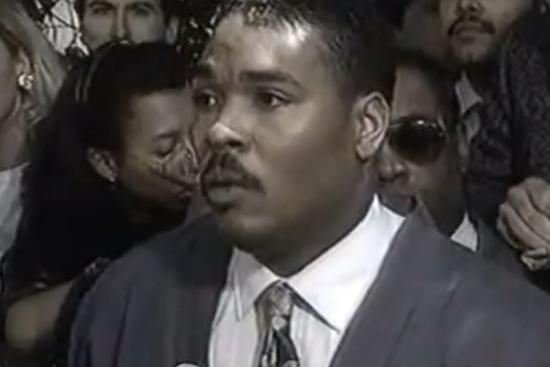Put people together and you’re sure to find trouble. Families, husbands and wives, siblings, cousins, politicians; no matter how you find them, people always have trouble getting along. Human society reflects just how terribly difficult it is; when large groups of people organize, it often leads to conflict and warfare with other large groups of people.
One history of the world, despite aspirations otherwise, is a history of human conflict. These conflicts range across every social strata, race, political persuasion, and geographical location. It should be added that such conflict is mostly promulgated and acted upon by men. This is not to say that women do not participate in matters of conflict; there are plenty of women who like to fight, but we must concede that the world’s history of violent conflict is male history.
It is for this reason–people can’t just get along–that America is a nation of laws and not simply customs. And not only is America a nation of laws, but a nation of written laws, beginning with a written Constitution and Bill of Rights. Unlike Britain, which has no written constitution, the United States is an experiment in democracy dependent upon the written word. In this sense, America has always been and continues to be rooted in “textualism,” enacting and imposing legislation governing behavior in the form of written laws using common language.
While far from perfect, and subject to interpretation about intent and meaning, using “rule-of-law” as the social framework for relating to each other is our solution to containing and resolving conflict. To be sure, the rule-of-law is no panacea; to the contrary, laws do not prevent all conflict and serve mostly to ascertain and assign responsibility. Thus conflict continues, it’s causes often unaddressed in favor of close attention to its effects.
The nature of human conflict is so diverse and ever-changing, the laws written to keep up with it are endless. Every cultural change, from the introduction of new technologies to trends in art and music, cultivates conflict. Those who imagine a world without conflict are doomed to disappointment; culture and society are in a state of continuous, dynamic flux. So too are the laws we invent to respond to cultural change.
Arguing over laws is our substitute for interpersonal conflict–sometimes violent conflict–with each other. In principle, laws are the great equalizer, law enforcement applied uniformly across social classes. In practice, unfortunately, this is often not the case. Differential power relationships deeply influence the ways in which laws are written and applied.
Applying the law is itself a matter of conflict, as we now witness the effects of polarized politics; the appointment of justices to the Supreme Court, rewriting of government regulations, and unlimited campaign contributions are all examples of lawful conflict. Inevitably, the laws written to manage and adjudicate human conflict are themselves manipulated and become a theatre of conflict.
Though we can imagine getting along, and when inclined are actually capable of doing so, our tendencies towards violence, greed and aggression prompt laws of all sort: religious, secular, criminal, civil, trade, commerce, marital and so forth. Thus, the unfortunate answer to the plaintive question posed by Rodney King (pictured above), the black motorist in Los Angeles severely beaten by police officers in 1991 — “Can we all get along?” — regrettably, remains “no.”

Here’s some great tactics from the I Ching for how best to not get along:
“Even if only one inferior man is occupying a ruling position in a city, he is able to oppress superior men. Even a single passion still lurking in the heart has power to obscure reason. Passion and reason cannot exist side by side–therefore fight without quarter is necessary if the good is to prevail.”
“In a resolute struggle of the good against evil, there are, however, definite rules that must not be disregarded, if it is to succeed. First, resolution must be based on a union of strength and friendliness. Second, a compromise with evil is not possible; evil must under all circumstances be openly discredited. Nor must our own passions and shortcomings be glossed over. Third, the struggle must not be carried on directly by force. If evil is branded, it thinks of weapons, and if we do it the favor of fighting against it blow for blow, we lose in the end because thus we ourselves get entangled in hatred and passion. Therefore it is important to begin at home, to be on guard in our own persons against the faults we have branded. In this way, finding no opponent, the sharp edges of the weapons of evil becomes dulled. For the same reasons we should not combat our own faults directly. As long as we wrestle with them, they continue victorious. Finally, the best way to fight evil is to make energetic progress in the good.”
Very interesting read. I do get along with most people although there are some that simply rub me the wrong way. Most bleeding heart liberals push my buttons and exsteme racists on the far right get my goat. But day to day I do get along with most people. It does appear you are right Larry – when i watch the news it does seem most people are at war with each other.
I can think of only a few examples of conflict resolution within the last century of human history that point toward progress in human affairs: Non-violent active resistance as practiced by Gandhi and MLK; establishment of the United Nations after WW2; and the Truth & Reconciliation Commission in South Africa after apartheid. No, they were not and are not the perfect solutions to our propensity for violent conflict, but they are steps in the right direction. What’s left to do is the decision to walk those paths.
~ Ghandi & King were assassinated.
~ Jesus was crucified.
What’s changed?